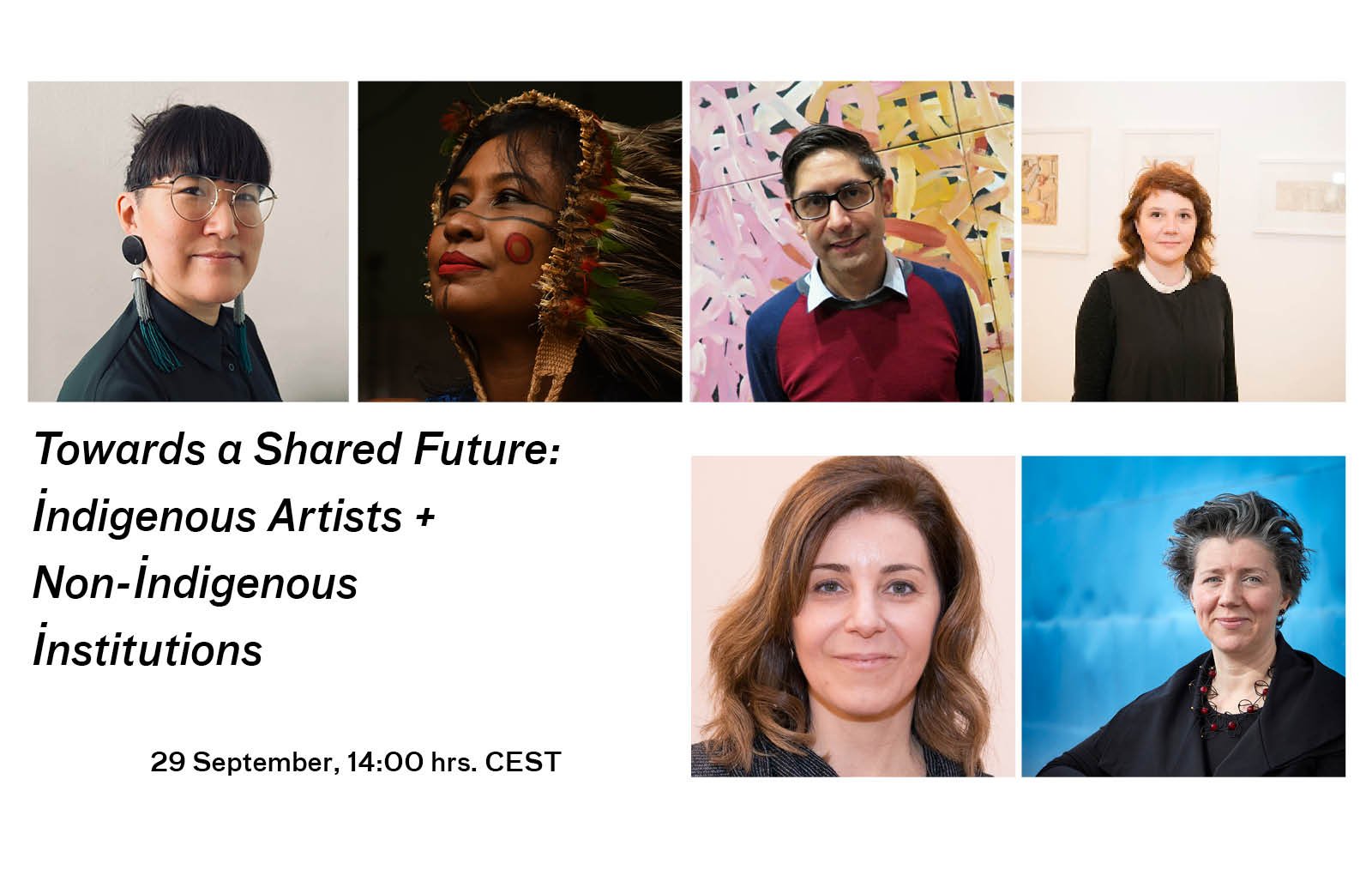Towards a Shared Future: Indigenous Artists + Non-Indigenous Institutions

Thursday 29 September 2022, 14:00 hrs. CEST.
Towards a Shared Future: Indigenous Artists + Non-Indigenous Institutions
While art institutions continue to be entangled in private, public, and political interests, today we desire to work together with Indigenous artists in relation to one another as equals, sharing resources, space, and responsibility, and to model structural change that celebrates multi-centred perspectives true to our own time.
This webinar is conceived as an open and generative discussion about working across cultures with Indigenous artists, cultural producers and curators in the context of art institutions as we move forward to continue to build collections and curatorial and public programs that observe cultural protocols and reflect the diverse social values of our time, while also contributing to them. Offering recent projects in Canada and Brazil as case studies to learn and develop meaningful relationships of trust and reciprocity, the discussion will suggest generative questions and strategies.
Towards a shared future requires a radical rethinking of all aspects of curatorial work. This rethinking is not a single act, but rather it is a relentless dismantling and ongoing resistance. It is a long-term, persistent uprooting manifested daily and in all actions. These cumulative acts reconsider and adjust routine institutional procedures, from writing artist contracts to translating wall texts into Indigenous languages to hires and policies and everything in between.
- How do non-Indigenous curators rearticulate their responsibilities, no longer from a singular authoritative position, but now rather in relation to one another?
- How do non-Indigenous curators confront and hope to reposition their institution’s core identity as deeply implicated in the development of their national art as a field of research, collection, and dissemination, while acknowledging that historically such institutions have purposefully refrained from collecting/exhibiting the work of Indigenous artists?
- How can we unsettle systems, resist, disrupt the power dynamics, and support and centre Indigenous artists voices and narratives, lived experience and agency?
- Is it in fact possible to achieve such changes and can we hope to eradicate beliefs that are entrenched within contemporary society? What would we create instead?
Invited Speakers
- Fernanda Pitta, Assistant Professor and curator at MAC University of São Paulo , São Paulo; Brazil
- Naine Terena, Researcher, curator and artist educator, Brazil
- Stephen Gilchrist, Senior Lecturer, School of Indigenous Studies, University of Western Australia
- Jocelyn Piirainen, Associate Curator of Inuit Art at the Winnipeg Art Gallery-Qaumajuq, Winnipeg, Canada
Moderated by Valéria Piccoli, Chief Curator, Pinacoteca de São Paulo, Brazil, Georgiana Uhlyarik, Fredrik S. Eaton Curator, Canadian Art, Art Gallery of Ontario, Toronto, Canada. With the support of Calin Dan, CIMAM Board member, General Director, MNAC Bucharest, National Museum of Contemporary Art.

CIMAM 2022 Rapid Response Webinars are made possible with the support from the Getty Foundation through its Connecting Professionals/Sharing Expertise initiative.
Biographies
- Fernanda Pitta
Fernanda Pitta, PhD, Assistant Professor and Curator at the Museum of Contemporary Art of the University of São Paulo, MAC-USP. She was a Fellow of the Association of Museum Curators in the International Engagement Program (2017-2018), Fellow of the International Summer Group Program at The Clark Art Institute (summer 2017), Pitta received the Library Grant from the Getty Research Institute (April 2022). She is a member of the Brazilian Committee of Art History, CBHA, and Brazilian coordinator of the project Decay without mourning: future thinking heritage practices, funded by the Riksbankens Jubileumsfond (GI21-0001), dedicated to reflect on preservation strategies for Aesthetic Manifestations of Indigenous peoples in Brazil and their relationship with art institutions.
- Naine Terena de Jesus
Master of arts, PhD in education, communicator. Woman of the Terena people, she is a teacher, curator, and educational artist. She is a professor in the specialization in cultural management - expansion of repertoires, the Itaú Cultural Institute and researcher of the DECAY project, funded by riksbankens Jubileumsfond and creator of the Indigenous Ethnomedia Exhibition. Visit the repository (MsCultura MT Award 2021) to learn more about your productions: https://oraculocomunica.eco.br/repositorio/
- Stephen Gilchrist
Belonging to the Yamatji people of the Inggarda language group of northwest Western Australia, Stephen Gilchrist is Senior Lecturer in the School of Indigenous Studies at the University of Western Australia. Before this, he taught in the department of Art History at the University of Sydney. He is a writer and curator who has worked with the Indigenous Australian collections of the National Gallery of Australia, Canberra (2003-2005), the British Museum, London (2008), the National Gallery of Victoria, Melbourne (2005-2010) and the Hood Museum of Art, Dartmouth College (2011-2013). He was a curatorial Attaché for the 20th Biennale of Sydney under the Artistic Directorship of Dr. Stephanie Rosenthal in 2015-16. From 2012-2016, Stephen was the Australian Studies Visiting Curator at the Harvard Art Museums, Harvard University (2012-2016) where he curated Everywhen: the eternal present in Indigenous Art from Australia.
- Jocelyn Piirainen
Jocelyn Piirainen is an urban Inuk living and working on Treaty 1 territory, in Manitoba. Originally from Ikaluktutiak (Cambridge Bay), Nunavut, she is currently the Associate Curator of Inuit Art at the Winnipeg Art Gallery-Qaumajuq. Her educational background has primarily focused on the arts - particularly film and new media. When not working as a curator, her artistic practice primarily involves analog photography and film, experimenting with Polaroids and Super 8 film — as well as honing her crochet and beading skills.
Thursday 29 September 2022, 14:00 hrs CEST.
Duration: 1h and 30 minutes (45 minutes of presentations followed by another 45 minutes of Q&A).
Rapid Response Webinars are free of cost for CIMAM members.
Non-Members can attend paying 10,00€ that will be deducted from their membership fee if they join CIMAM in the next 3 months.
→ The preferred payment method is PayPal invitations (with a credit card) which consist of receiving a link to easily pay without having a PayPal account.
This session will be recorded and posted at CIMAM’s Only Members section. We may use still images of the recording for CIMAM’s promotional purposes. If you’d rather not appear on that snapshot, please let us know in advance.
About CIMAM’s Rapid Response Webinars
Started in 2020, CIMAM has taken the new virtual scenario as an opportunity to launch a series of online activities exclusively for our community to, now more than ever, reinforce the sense of connectivity through online meetings in a peer to peer environment to share, learn, and be inspired by the experiences of other CIMAM professionals.